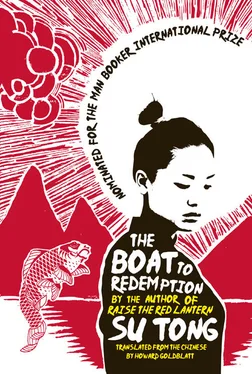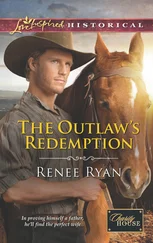I felt suddenly weary. I checked my watch; it was already gone one o’clock, well past the time my father had told me to be back onboard. Time to leave. I took a shortcut behind the steel warehouse and headed to the piers. It was a secluded path. I didn’t know if I should count myself lucky or unlucky, but I spotted several kids from the barges under the rear window of the warehouse; Sun Ximing’s younger son, Xiaofu, had climbed up on to the ledge and was prising the window open with a piece of wood. I knew they were up to no good. ‘What are you doing?’ I shouted.
With a wink, Xiaofu said, ‘Stealing iron to sell for scrap.’
‘I’m going to tell your father,’ I said. ‘You and your stealing! You little bastards are ruining the fleet’s good name.’
But my threat went in one ear and out the other, as he made a contemptuous gesture and said, ‘Mind your own business, Kongpi. What have you been up to? Ku Wenxuan is waiting for you with a rolling pin. You’re going to get a beating!’
Now I realized the trouble I was in. He wasn’t lying. I knew my father well enough to realize that coming home so late meant big trouble. So I left the kids to their own devices and turned back towards the piers, head down, my steps heavier than usual. But I hadn’t gone far before I turned and went back, thinking, I’m twenty-six years old, too old to stand on the bow of our barge and get a beating from my father. No way was I going to lose face in front of all those people. I’d be punished whether I got home an hour late or three hours late, so why not go ahead and smash the cracked pot — hang out ashore for as long as I wanted to?
The boat people went ashore for a haircut about once a month. I went to the People’s Barbershop every day. If the barge people had known that, they’d have said I’d lost my head over Huixian and that I deserved to be driven away by her.
I was the last person to understand what possessed me, but I knew that I’d lost my soul in the barbershop. When I was hurrying there, I sometimes heard the things in my bag bang against each other; those objects had more self-respect than I did, as they voiced their resistance. Don’t go, they said, don’t go. What do you plan to do? Who are you to her? Her brother? Her father? Her intended? No, you’re nothing, just a kongpi , that’s exactly what you are in her eyes.
That’s right, I was nothing but a kongpi , and that made me unhappy. There was so much I wanted to say to her, so why did nothing come out of my mouth the minute I laid eyes on her? I didn’t want that to be so. Why was I filled with affection each time I stepped into the barbershop, but left feeling angry and resentful? How could love so easily turn into hate? I didn’t want that to be so. And since I didn’t, I kept returning to the People’s Barbershop like a moth to a flame.
Thoughts thronged my mind as I walked along, including memories of the time years before when I had helped poor little Huixian put up posters in Milltown looking for her mother. I passed the general store, where the intersection was flooded with sunlight, and I was taken back in time. I conjured up an image of a little girl carrying a jar of glue and heard her childish voice as she said urgently, ‘Over here, Brother Dongliang. Come here!’ I felt myself being pushed along, despite my weariness. It might have been the wind propelling me on, but probably it was my memories. My gaze wandered to the wall across the street from the general store; a large blackboard, recently mounted on the wall, was filled with drawings and clippings promoting family planning. A coloured propaganda image in the centre caught my eye with the words
BOYS OR GIRLS, IT MAKES NO DIFFERENCE:
JUST HAVE ONE CHILD!
printed above a drawing of a young mother standing in a bed of flowers, a baby girl in her arms. Possibly because the artist wasn’t particularly talented, the smile on the face of the rosy-cheeked mother was stiff and unnatural. As for her baby, either the elements or the mischievous actions of some child had reduced her head to a pair of pigtails — the face was gone. The poster alarmed me. Could that be Huixian? Fanciful thoughts swirled in my head. Was that her missing mother? What a strange day it had been, with all these missing mothers suddenly returning. The memory of a name I’d all but forgotten formed in my head: Cui Xia. Was Cui Xia her name? The woman who had paced the shore in the rain way back then, now hidden among the crowds in the town’s streets, her dripping-wet spirit now bright and dry, with no hope of being set free. She poured out her heart to me from the blackboard, nudging me to go and look for her daughter. My daughter has forgotten her mother. My daughter, she’s lost . My attention was focused on a water mark running down the blackboard, unbroken tears from a mother’s departed spirit. Don’t forget that my daughter is an orphan. She has grown into a beautiful, alluring young woman, but she remains an orphan. She is like a precious gem, picked up, discarded and picked up again; but she’ll wind up being discarded again, and I ask one of you kind-hearted people to come to her aid!
I received a flash of mystical inspiration there in front of the general store, which rocked me to my core and made my feet feel as if they were made of lead.
The sound of cotton-fluffing filled the air around the barbershop — peng, peng, peng — a happy, monotonous sound that reminded me to see if I had enough money to buy Father new cotton stuffing for his quilt, since that would give me an excuse for staying away so long. So I went into the cotton-fluffing shop and told the proprietor what I wanted. ‘New cotton is very expensive,’ she said. ‘You’re better off bringing in your own used cotton.’
‘I don’t have any.’
‘How about making some out of your lightest and cheapest cotton?’ They asked how soon I needed it.
‘Not too soon, but not too late either. I’ll wait in front of the barbershop.’
She gave me an ambiguous look. ‘I know what you’re thinking,’ she blurted out. ‘Were you and that Huixian across the street betrothed as children?’
That shocked me. ‘Where did you hear that?’
‘I didn’t hear it, I guessed it. You were together on one of those barges, weren’t you? That’s something you boat people do all the time.’
The man in the shop stopped beating cotton and brushed off the fluff that nearly covered his body. With a silly grin, he said, ‘Child engagements don’t count, and I suggest you put those thoughts out of your head. That Huixian is a lovely flower that blooms on a high branch, way beyond the reach of any lowly boat person.’
Struck with a sudden panic attack, I blurted out what was in my heart: ‘I don’t want to pluck the flower, I want to protect it.’
* * *
My heart had been in my mouth the last time I’d visited the People’s Barbershop. I pushed open the glass door, but stopped before going in. ‘Kongpi!’ they shouted as I stood in the doorway. ‘Kongpi’s back!’ It was immediately obvious that the barbers had begun to see me as a strange creature, and I noticed the look in Huixian’s eyes, both fear and disgust, mixed with a degree of pity.
After a brief, whispered exchange with Little Chen, Old Cui jumped down off his stool, came to the doorway and gave me a shove. ‘What the hell do you want, Kongpi?’ he asked, using uncouth Milltown slang. ‘You’re here every day. Do your balls itch or something? You look like a damned debt collector, and I want to know what the hell Huixian owes you. Is it money? Food? How much? Give me a number.’
I was stunned that Huixian would ask him to settle up with me. What did she take me for? I pushed him away and said, ‘It’s none of your damned business! If she wants to settle accounts, let her tell me to my face.’
Читать дальше












